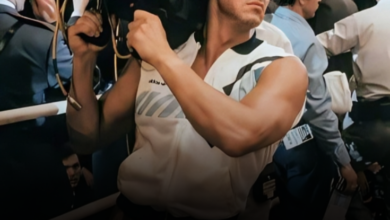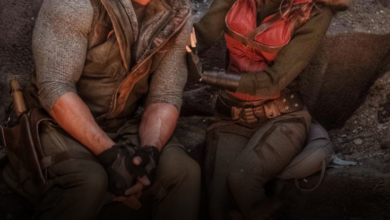Emilia Clarke Talks About the Tensions of Modern Motherhood in The Pod Generation – ‘It’s Not Just About How the Baby Comes’
OPINION: This article may contain commentary which reflects the author's opinion.
Emilia Clarke, best known for her iconic role as Daenerys Targaryen in Game of Thrones, has become a multi-faceted force in Hollywood. In addition to her acting career, she has ventured into producing, and her 2023 film The Pod Generation offers a compelling exploration of modern motherhood. Directed by Sophie Barthes, this science fiction romantic comedy presents a near-future New York City where artificial intelligence and technology significantly impact the most fundamental aspects of life—especially pregnancy.
The Pod Generation: A Vision of Modern Motherhood
In The Pod Generation, Clarke plays Rachel Novy, a career-driven tech executive who embraces futuristic technology to redefine motherhood. Set in a world where pregnancy can be outsourced to detachable artificial wombs, or “pods,” Rachel’s decision to use this technology creates a central conflict in the story. Opposite her is Alvy Novy, played by Chiwetel Ejiofor, a botanist who prefers a more natural approach to parenting. Their differing views on childbirth reflect larger societal debates about technology’s role in shaping our lives and our most intimate experiences.
Rachel’s character, as portrayed by Clarke, navigates the complexities of balancing a high-powered career with the demands of motherhood. As an executive at Pegazus, a tech conglomerate, Rachel gains access to the Womb Center’s pod services after receiving a promotion. This advancement in technology enables her to bypass the traditional physical and professional interruptions that accompany pregnancy, allowing her to maintain her career trajectory. For Rachel, modern motherhood becomes an extension of her professional identity, reflecting a pragmatic approach that resonates with today’s conversations about work-life balance.
Technology and Motherhood: A Double-Edged Sword
The film presents a stark contrast between Rachel’s embrace of technological innovation and Alvy’s skepticism about its implications. Rachel’s view is summed up in her comment: “It doesn’t matter how the baby comes, as long as the ends are the same.” This sentiment highlights her focus on the outcomes—becoming a mother—while bypassing the physical and emotional experiences typically associated with pregnancy. Rachel’s pragmatic approach to motherhood reflects a modern view where technology enhances personal productivity, offering women the freedom to navigate both family and professional aspirations without compromise.
However, the film also raises important questions about the potential costs of technological solutions. Director Sophie Barthes discusses the cautionary tale embedded in the film, particularly the idea that technology may disconnect us from our instincts, especially in the context of motherhood. Barthes noted in an interview with Variety that while technology should help us, it might also make us lose touch with essential human experiences: “Although we conceived the technology, it should be here to help us, but I actually think it’s making us disconnect from our instincts.”
Clarke’s portrayal of Rachel, while reflective of a tech-savvy, modern approach to motherhood, aligns with this critique. The film suggests that while advancements like the pod may offer convenience, they also raise deeper concerns about the commodification of pregnancy and the possible erosion of personal, emotional connections to the experience of motherhood.
Emilia Clarke’s Personal Investment in The Pod Generation
Clarke’s involvement with The Pod Generation goes beyond her acting role; she also served as an executive producer on the film, indicating her personal investment in its themes. In an interview with Collider, Clarke revealed her deep enthusiasm for the project, noting, “I have a production company and that has kind of been folded within this which is just the best thing in the whole wide world.” This level of involvement highlights Clarke’s commitment to exploring the complexities of modern motherhood, a theme that is central to the film.
While direct quotes from Clarke about motherhood are limited, her role as producer speaks volumes about her own reflections on the subject. The film’s critique of modern society’s shift towards tech-driven solutions to personal experiences aligns with Clarke’s own nuanced take on motherhood. Through Rachel, Clarke portrays a woman who must navigate the fine line between convenience and emotional disconnect—a dilemma many women face today in balancing career ambitions with the demands of family life.
A Satirical Look at Tech-Driven Solutions
One of the more subtle yet powerful aspects of The Pod Generation is its satire of society’s increasing reliance on technology. The film critiques how we fetishize a “digital utopia,” where technological solutions are seen as the answer to all of life’s challenges. By turning the very act of pregnancy into a commodity, the film pushes viewers to reflect on the deeper societal implications of such advancements.
This theme is especially resonant when considering Clarke’s portrayal of Rachel, whose decision to use the pod technology is not just a personal choice but also a reflection of broader societal shifts. The film imagines a future where the very essence of motherhood is outsourced, offering a sharp commentary on the possible loss of power and agency women might face as technology becomes more integrated into personal decisions.
Conclusion: A Complex Portrait of Modern Motherhood
Emilia Clarke’s role in The Pod Generation offers a thought-provoking perspective on modern motherhood, exploring the tension between technological convenience and emotional authenticity. As Rachel, Clarke brings to life a character who grapples with balancing her career and family life in a world dominated by technological innovation. Through the film’s exploration of this balance, Clarke encourages a broader conversation about how technology is reshaping the most fundamental human experiences.
Ultimately, The Pod Generation presents a cautionary tale about the potential costs of relying too heavily on technology. By using her platform as both an actress and producer, Clarke invites us to question what we might lose in our pursuit of progress—especially when it comes to the deeply personal journey of motherhood.



